A compromised Russian asset, even if the President of the United States, cannot be guilty of treason unless we are 'at war' with Russia...
 Of all of the reactions to the July 16 joint press conference in Helsinki, Finland in which Russian President Vladimir Putin and U.S. President Donald Trump responded to reporters' questions, perhaps the harshest assessment came in a Tweet by former CIA Director John Brennan.
Of all of the reactions to the July 16 joint press conference in Helsinki, Finland in which Russian President Vladimir Putin and U.S. President Donald Trump responded to reporters' questions, perhaps the harshest assessment came in a Tweet by former CIA Director John Brennan.
Trump's "performance", Brennan contended, "rises to & exceeds the threshold of 'high crimes & misdemeanors.' It was nothing short of treasonous."
Brennan may have been uniquely positioned to offer that assessment since he was amongst the intelligence officials, who, on Jan. 6, 2017, showed President-Elect Trump emails and texts between high-level members of Russia's military intelligence agency, the GRU, that purportedly establish that Putin had personally ordered the cyberattack on the 2016 election.
Various half-hearted walk-backs aside, Trump's continued refusal to accept that Putin personally ordered Russia's alleged cyberattacks on the 2016 election and denial that any such attacks might have even taken place, is at odds with (a) the bipartisan conclusions offered by the U.S. Senate Intelligence Committee; (c) an extraordinarily detailed, 37-page speaking indictment in February, setting forth how 13 Russians and 3 Russian companies allegedly carried out an illegal foreign influence campaign, and (d) the more recent, 29-page, July 13 indictment filed against 12 members of the GRU, laying out the dates and specific manner in which named individuals are said to have carried out cyberattacks on the DNC, Hillary Clinton's campaign chair and many others.
The July 13 indictment also details the manner in which Special Counsel investigators say emails --- purloined information --- from several of those attacks were weaponized for release during the campaign and that, for the first time, the GRU had targeted Clinton's "personal office" emails on the very same day that candidate Trump publicly called for Russia to find her "missing" emails during a July 27, 2016 campaign rally.
Ironically, as observed by MSNBC's Lawrence O'Donnell, Trump's decision to cast aside the unanimous conclusions of U.S. intelligence and law enforcement after the Helsinki summit was promptly followed by a "Perry Mason moment" when Putin was questioned by Reuters correspondent Jeff Mason at the joint press conference of the two Presidents:
Early-on, as we reported last February, after accepting an assignment to conduct a human-sourced intelligence investigation into Trump's ties to Russia, Christopher Steele, a former British MI-6 intelligence officer, informed Glenn Simpson of research firm Fusion GPS that he, Steele, had a professional responsibility to report his findings to the FBI. He explained his reasoning at the time. Steele believed he'd uncovered a "crime in progress" and that there was a chilling prospect that the man who might become the 45th President of the United States was and is a compromised Russian asset.
Hillary Clinton appeared to share Steele's concern. During a debate, she not only described Trump as "Putin's puppet," but also presciently added: "You encouraged espionage against our people, sign up for his wish list: break up NATO, do whatever he wants."
The very notion that a Commander-in-Chief could be a compromised foreign asset is so unprecedented that it is difficult to comprehend. Just think how history would have turned out if it had been George Washington instead of General Benedict Arnold who had committed treason.
Yet, the factors that suggest Trump is indeed compromised include, but are not limited to, (a) the retention of Michael Flynn for 18 days after Acting AG Sally Yates warned the White House that the DOJ believed Flynn was a compromised Russia asset, firing him only after Flynn was publicly exposed by the Washington Post; (b) the disclosure of highly classified information to Russia's ambassador during an Oval Office meeting; (c) the continuing refusal to impose Congressionally enacted sanctions against Russia --- a refusal that violates the President's duty to see that the laws are faithfully executed --- and (d) Trump's performance at and after the Helsinki Summit.
If Trump is, indeed, a compromised Russian asset, it would represent a monstrous betrayal, a clear and present danger to the national security of the United States and grounds for his removal from office. But, as Brad Friedman correctly observed during a July 16 BradCast, the question as to whether that betrayal amounts to "treason" entails a difficult, unsettled and far murkier legal issue as to whether the U.S. and Russia are at war...
--- Click here for REST OF STORY!... ---



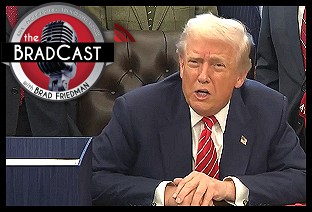 Losing Legally and Politically, Trump Threatens to 'Nationalize' Elections: 'BradCast' 2/3/26
Losing Legally and Politically, Trump Threatens to 'Nationalize' Elections: 'BradCast' 2/3/26 'Green News Report' 2/3/26
'Green News Report' 2/3/26
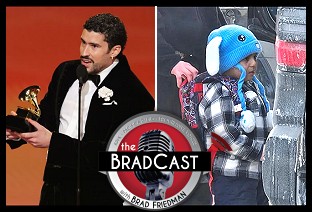 Bad and Good Bunnies, and an Electoral Shock Deep in 'Red' Heart of TX: 'BradCast' 2/2/26
Bad and Good Bunnies, and an Electoral Shock Deep in 'Red' Heart of TX: 'BradCast' 2/2/26  Sunday 'Mirror, Mirror' Toons
Sunday 'Mirror, Mirror' Toons It's About Elections and the Windmills of His Mind: 'BradCast' 1/29/26
It's About Elections and the Windmills of His Mind: 'BradCast' 1/29/26 'Green News Report' 1/29/26
'Green News Report' 1/29/26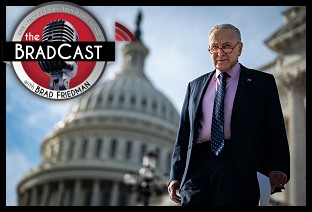 Govt Shutdown Over ICE Funding Near Certain This Weekend: 'BradCast' 1/28/26
Govt Shutdown Over ICE Funding Near Certain This Weekend: 'BradCast' 1/28/26 Trump Blinks, Bovino Out, MN Op Falters but Persists as Midterms Loom: 'BradCast' 1/27
Trump Blinks, Bovino Out, MN Op Falters but Persists as Midterms Loom: 'BradCast' 1/27 'Green News Report' 1/27/26
'Green News Report' 1/27/26 The ICE Murder of ICU Nurse Alex Pretti and the Heroes of Mpls: 'BradCast' 1/26/26
The ICE Murder of ICU Nurse Alex Pretti and the Heroes of Mpls: 'BradCast' 1/26/26  Sunday 'Worth a Thousand Words' Toons
Sunday 'Worth a Thousand Words' Toons 'Green News Report' 1/22/26
'Green News Report' 1/22/26 The BRAD BLOG: 22 Years and Still Counting
The BRAD BLOG: 22 Years and Still Counting Mr. Smith Testifies (Publicly) in Washington: 'BradCast' 1/22/26
Mr. Smith Testifies (Publicly) in Washington: 'BradCast' 1/22/26 World Turning Against Self-Destructing U.S. Under Trump: 'BradCast' 1/21/26
World Turning Against Self-Destructing U.S. Under Trump: 'BradCast' 1/21/26 Trump Waste, Fraud, Abuse on Voting, at DOJ, by DOGE: 'BradCast' 1/20/26
Trump Waste, Fraud, Abuse on Voting, at DOJ, by DOGE: 'BradCast' 1/20/26 'A Cornered Rat': Trump Terrorizes Minneapolis, Menaces NATO, World: 'BradCast' 1/15/26
'A Cornered Rat': Trump Terrorizes Minneapolis, Menaces NATO, World: 'BradCast' 1/15/26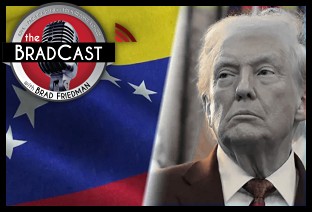 'Not Close to Over': Mad King Trump in Venezuela (& Beyond): 'BradCast' 1/14
'Not Close to Over': Mad King Trump in Venezuela (& Beyond): 'BradCast' 1/14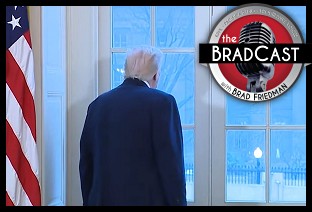 Things Getting Weirder as Trump Keeps Losing: 'BradCast' 1/13/26
Things Getting Weirder as Trump Keeps Losing: 'BradCast' 1/13/26 After ICE Murder in MN, Local Cops Disown Fed Policing Practices: 'BradCast' 1/12/26
After ICE Murder in MN, Local Cops Disown Fed Policing Practices: 'BradCast' 1/12/26
 VA GOP VOTER REG FRAUDSTER OFF HOOK
VA GOP VOTER REG FRAUDSTER OFF HOOK Criminal GOP Voter Registration Fraud Probe Expanding in VA
Criminal GOP Voter Registration Fraud Probe Expanding in VA DOJ PROBE SOUGHT AFTER VA ARREST
DOJ PROBE SOUGHT AFTER VA ARREST Arrest in VA: GOP Voter Reg Scandal Widens
Arrest in VA: GOP Voter Reg Scandal Widens ALL TOGETHER: ROVE, SPROUL, KOCHS, RNC
ALL TOGETHER: ROVE, SPROUL, KOCHS, RNC LATimes: RNC's 'Fired' Sproul Working for Repubs in 'as Many as 30 States'
LATimes: RNC's 'Fired' Sproul Working for Repubs in 'as Many as 30 States' 'Fired' Sproul Group 'Cloned', Still Working for Republicans in At Least 10 States
'Fired' Sproul Group 'Cloned', Still Working for Republicans in At Least 10 States FINALLY: FOX ON GOP REG FRAUD SCANDAL
FINALLY: FOX ON GOP REG FRAUD SCANDAL COLORADO FOLLOWS FLORIDA WITH GOP CRIMINAL INVESTIGATION
COLORADO FOLLOWS FLORIDA WITH GOP CRIMINAL INVESTIGATION CRIMINAL PROBE LAUNCHED INTO GOP VOTER REGISTRATION FRAUD SCANDAL IN FL
CRIMINAL PROBE LAUNCHED INTO GOP VOTER REGISTRATION FRAUD SCANDAL IN FL Brad Breaks PA Photo ID & GOP Registration Fraud Scandal News on Hartmann TV
Brad Breaks PA Photo ID & GOP Registration Fraud Scandal News on Hartmann TV  CAUGHT ON TAPE: COORDINATED NATIONWIDE GOP VOTER REG SCAM
CAUGHT ON TAPE: COORDINATED NATIONWIDE GOP VOTER REG SCAM CRIMINAL ELECTION FRAUD COMPLAINT FILED AGAINST GOP 'FRAUD' FIRM
CRIMINAL ELECTION FRAUD COMPLAINT FILED AGAINST GOP 'FRAUD' FIRM RICK SCOTT GETS ROLLED IN GOP REGISTRATION FRAUD SCANDAL
RICK SCOTT GETS ROLLED IN GOP REGISTRATION FRAUD SCANDAL VIDEO: Brad Breaks GOP Reg Fraud Scandal on Hartmann TV
VIDEO: Brad Breaks GOP Reg Fraud Scandal on Hartmann TV RNC FIRES NATIONAL VOTER REGISTRATION FIRM FOR FRAUD
RNC FIRES NATIONAL VOTER REGISTRATION FIRM FOR FRAUD EXCLUSIVE: Intvw w/ FL Official Who First Discovered GOP Reg Fraud
EXCLUSIVE: Intvw w/ FL Official Who First Discovered GOP Reg Fraud GOP REGISTRATION FRAUD FOUND IN FL
GOP REGISTRATION FRAUD FOUND IN FL


























 Donald Trump's grip on reality seems to be slipping more and more each day. Or, at least his
Donald Trump's grip on reality seems to be slipping more and more each day. Or, at least his  On today's
On today's  Of all of the reactions to the July 16 joint press conference in Helsinki, Finland in which Russian President Vladimir Putin and U.S. President Donald Trump responded to reporters' questions, perhaps the harshest assessment came in a
Of all of the reactions to the July 16 joint press conference in Helsinki, Finland in which Russian President Vladimir Putin and U.S. President Donald Trump responded to reporters' questions, perhaps the harshest assessment came in a 












